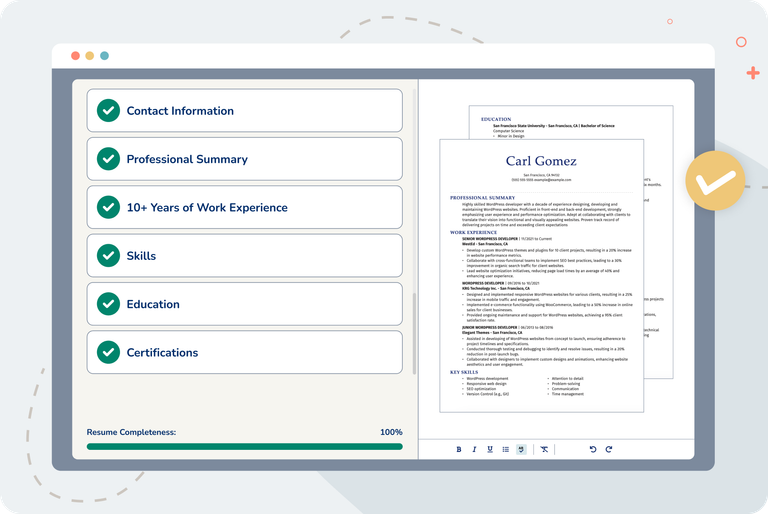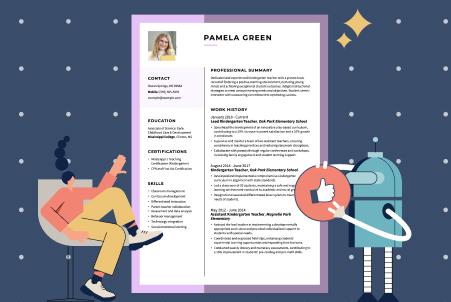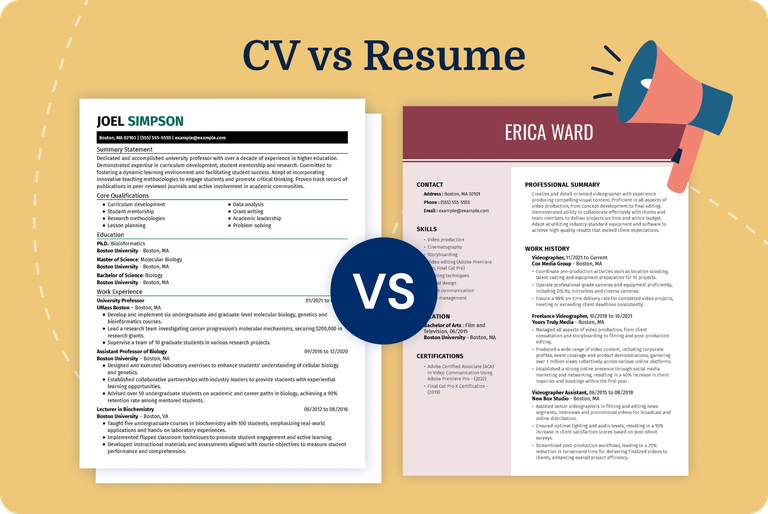Table of Contents
Get started with MyPerfectResume today!
- Build a resume on any device
- Pick an ATS-friendly template
- Tailor with AI copy suggestions
Why this resume works
- Highlights industry-specific skills: Mastering method acting and script analysis, the applicant seamlessly fits into both theatrical and on-screen roles, showcasing a deep understanding of industry-specific skills.
- Quantifies accomplishments: Resume accomplishments like appearing in TV series with 5M viewers and plays selling over 10,000 tickets emphasize the applicant’s significant reach.
- Illustrates problem-solving ability: Improvising dialogue in 10% of scenes highlights the applicant’s problem-solving skills and creativity, both essential traits of a good performance.
More Acting Resume Examples
Take a look at more resume examples to learn how to showcase your performance skills, on-stage experience, and versatility. These samples will help you craft a resume that highlights your unique talent for casting opportunities.
Writer
Why this resume works
- Puts skills at the forefront: By using a skills-based resume format, the applicant prioritizes skills like SEO optimization and content strategy. This format is best when you’re early in your carer.
- Effective use of keywords: Strategically inserting role-relevant keywords such as content management and copywriting helps the resume navigate candidate-screening applicant tracking systems.
- Shows digital literacy: Proficient use of digital tools like content management systems and analytics platforms showcases the applicant’s computer skills, which aligns well with the modern workplace.
Director
Why this resume works
- Includes a mix of soft and hard skills: Intertwining strategic planning and interpersonal skills, the applicant effectively balances technical expertise with team leadership for high-impact business outcomes.
- Demonstrates language abilities: Knowing some Spanish, French, and German demonstrates the type of language skills that facilitate cross-cultural communication and international collaborations.
- Points to measurable outcomes: Driving 30% revenue growth while reducing overhead by $200K annually highlights a strong focus on measurable outcomes and financial improvement.
Model
Why this resume works
- Focuses on work history: By structuring their work history in a chronological format, the applicant provides evidence for extensive career experience and growth.
- Showcases impressive accomplishments: Including standout accomplishments on your resume like leading a national campaign and being featured on global magazine covers highlights top-tier performance.
- Sections are well-organized: Organized sections with clear bullet points and headers make the resume easy to scan, improving its reader-friendly layout for quick processing.
Acting Resume Template (Text Version)
Olivia Thompson
Cleveland, OH 44101
(555)555-5555
Olivia.Thompson@example.com
Professional Summary
Dynamic actor with 4 years of diverse theatrical and television experience, known for mesmerizing performances in high-profile productions. Proficient in method acting and character development, driven by a passion for creative expression and audience engagement.
Work History
Actor
Starlight Productions – Cleveland, OH
March 2023 – May 2025
- Performed in TV series watched by 5M viewers
- Improvised dialogue in 10% of scenes
- Led a cast of 20 in six major productions
Theater Performer
Broadway Dreams – Northwood, OH
May 2021 – February 2023
- Starred in a play with 10,000+ ticket sales
- Directed scenes attended by 200+ patrons
- Improved audience engagement score by 30%
Drama Instructor
Creative Arts Academy – Cleveland, OH
May 2019 – April 2021
- Taught 50+ students various acting techniques
- Conducted workshops with 90% satisfaction
- Designed 3 distinctive drama courses
Languages
- Spanish – Beginner (A1)
- French – Beginner (A1)
- German – Intermediate (B1)
Skills
- Method Acting
- Script Analysis
- Improvisation
- Character Development
- Vocal Projection
- Physical Theatre
- Public Speaking
- Stage Presence
Certifications
- Certified Acting Instructor – National Drama Association
- Advanced Improvisation Techniques – Comedy Arts Society
Education
Master of Fine Arts Acting
University of Southern California Los Angeles, California
May 2018
Bachelor of Arts Theater Arts
University of California, Los Angeles Los Angeles, California
May 2016
Related Resume Examples
Advice for Writing Your Acting Resume
Whether you’re stepping onto the stage or in front of the camera, it’s key to highlight your unique talents and experiences. Explore our tips on how to write a resume tailored for actors and discover how to present your skills and achievements in the spotlight.
Showcase your portfolio or projects
For acting roles, including a portfolio is very important. Your portfolio allows you to display your range and talent in a way words on a resume can’t fully capture.
A well-organized portfolio can include clips from performances, pictures, and even links to full videos if available. By sharing your work visually, you’re giving casting directors and potential collaborators a real sense of what you can do. This also helps them imagine how you might fit into their projects.
When including your portfolio or projects in your resume, think about linking to an online platform like Behance or creating a personal website where everything is neatly organized.
You should also list projects on your resume. For each project, mention the name, who it was for (like a theater company or school), and give a short description of what it was about. Don’t forget to highlight what you did specifically and how it made an impact on the performance or film.
Remember that all types of projects count — freelance gigs, school plays, and even side projects you’ve done for fun can show off your skills and passion for acting. This variety shows that you are actively building experience and are committed to growing in the field.
Example of a projects section
Lead Role in ‘The Phantom of the Opera’
Broadway Theater
Apr 2022 – Sep 2022
- Portrayed the character of The Phantom in over 100 performances, receiving critical acclaim.
- Worked closely with the director to refine character nuances and stage presence.
- Engaged audiences nightly, resulting in sold-out shows for the entire run.
Supporting Role in Independent Film ‘Echoes of Silence’
Sunrise Studios
Jan 2021 – Jun 2021
- Played a pivotal supporting role, contributing significantly to the film’s emotional depth.
- Collaborated with fellow actors to build authentic on-screen relationships.
- Helped promote the film at various festivals, improving audience reach and reception.
Get great ideas for your resume by checking out our professional resume examples. They show you how to organize your info just like successful job seekers do.
Emphasize your most relevant skills
In acting, both technical and soft skills play a big role in bringing characters to life.
Technical skills might include understanding how to use specific software for auditions or self-taping, while soft skills could involve voice modulation, body language, and emotional expression.
It’s helpful to have a Skills section on your resume that lists these abilities clearly. This lets casting directors see at a glance what you bring to the table.
When describing your past work experiences, weave these skills into your bullet points for more impact. For example, instead of just saying you played a role in a school play, mention how you used improvisation techniques to improve the performance or collaborated with others to perfect scenes.
Overall, balancing technical abilities with creative flair will set you apart from other actors. By carefully showcasing these skills throughout your resume, you’ll paint a full picture of your talents and readiness for any role that comes your way.
For actors, select a resume format that highlights your roles, training, and special skills clearly.
Choose a professional resume template
When choosing a resume template for an acting role, aim for one that mixes creativity with professionalism. Seek out clean and structured designs that highlight visual hierarchy to naturally guide the reader’s eye through your experience and skills.
Steer clear of templates with overly decorative elements or excessive graphics that could distract from the content. A simple design with clear sections will help maintain focus on your qualifications while presenting a polished look.
Also, make sure to pick a format compatible with applicant tracking systems (ATS). Many casting agencies and production companies use these systems to review resumes, so select a layout featuring standard fonts, straightforward headings, and avoiding complex formatting like tables or images. Templates with clearly labeled sections such as “Experience,” “Education,” and “Skills” are perfect for making your resume easy to read by both people and software.
Remember, balance is key — your resume should feel professional but also leave room to showcase creativity relevant to acting.
Need to create a standout resume quickly? Our Resume Builder helps you organize your roles, skills, and experiences in a way that grabs attention.
Format your resume properly
Proper resume formatting makes your acting resume easy to read and professional. Since acting roles often need specific skills instead of lots of past jobs, a functional resume that focuses on skills is often best. Additionally, we’ve collected a few tips that can help you stand out.
5 resume formatting tips
- Structure with clear headings: Include sections like like Work Experience and Portfolio for easy navigation.
- Choose consistent fonts: Select readable fonts such as Arial or Calibri in a 10-12 pt size.
- Use bullet points: Present achievements and roles using bullet points for quick scanning.
- Limit to one page: Keep resumes to one page unless possessing extensive acting experience.
- Ensure proper spacing and alignment: Apply consistent spacing and alignment to maintain a clean, professional appearance.
Make sure your resume gets through applicant tracking systems! Our ATS Resume Checker finds common problems and gives tips to make your resume better.
Salary Insights for Actors
Thinking about your next career move or a new city to live in? Salary data from the U.S. Bureau of Labor Statistics can show you what to expect for pay and job trends. Keep reading for more details!
Top 10 highest-paying states for actors
Actors earn varying salaries across the United States, with a national average of $46,269. The table below highlights the states where actors command the highest compensation.
Our salary information comes from the U.S. Bureau of Labor Statistics’ Occupational Employment and Wage Statistics survey. This official government data provides the most comprehensive and reliable salary information for writers across all 50 states and the District of Columbia. The figures presented here reflect the May 2025 dataset, which is the most recent available as of this publication.
| State | Average Salary |
|---|---|
| Pennsylvania | $55,390 |
| Montana | $53,080 |
| Washington | $52,300 |
| Minnesota | $52,840 |
| Maine | $52,460 |
| Oregon | $51,120 |
| Illinois | $51,770 |
| New York | $50,270 |
| South Carolina | $49,590 |
| . California | $49,750 |
FAQ
Do I need to include a cover letter with my acting resume?
Yes, it’s a smart move to include a cover letter with your acting resume.
A cover letter lets you introduce yourself and share why you’re excited about this specific role or production.
It gives you the chance to highlight any unique skills or experiences that might not be clear from your resume alone, like special training in dialects or stage combat.
For example, if a director is known for a certain style or genre, you can talk about how your background fits with their work and inspires you.
Consider checking out cover letter examples for actors to see what works well and tailor it to match your personality and career goals.
You can use tools like the Cover Letter Generator to make the process easier.
How long should a acting’s resume be?
For an acting resume, sticking to a one-page resume is ideal. Casting directors often have limited time, so your resume should quickly communicate your most relevant experience and skills. Focus on listing your most recent and significant roles, training, and any special skills.
If you’ve accumulated extensive credits or unique experiences that are important for a specific role, a two-page resume can be acceptable. Just ensure that every entry is relevant and adds value to the particular job you’re targeting.
To better understand how long a resume should be at different stages of your career, explore guides on determining the ideal length tailored to your needs.
How do you write a acting resume with no experience?
If you lack acting experience, your acting resume should focus on your skills and training, as well as any outside-the-box experiences. Here are a few things to areas to focus on when you’re writing a resume with no experience:
- Start with a strong objective: Write a brief statement about your passion for acting and what you aim to achieve in the industry.
- List your training: Include any acting classes, workshops, or courses you’ve taken. Mention the name of the institution or instructor, along with the dates attended.
- Highlight relevant skills: Focus on skills like improvisation, voice modulation, dance, or accents. List anything that can make you stand out to casting directors.
- Include community or school theater: If you’ve participated in school plays or community theater productions, list them with details about your role and the production.
- Add other experiences: Feature any related experience such as public speaking, modeling, or volunteer work that demonstrate your comfort in front of an audience.
Remember to keep your resume concise and focused on showcasing how eager and prepared you are for opportunities in acting.
Rate this article
Acting
Share this page
Additional Resources

The Illusion of Wage Growth: Where Paychecks Stretch the Farthest
U.S. wages have climbed at one of the fastest rates in modern history. Between 2020 and 2024, the average American worker’s pay rose from about $64,000 to $75,600, an 18%

100+ Resume Objective Statement Examples & Best Practices
In just a sentence or two, a resume objective statement tells hiring managers the role or career path you’re aiming for and the unique skills and value you bring to

150+ Skills for a Resume: Examples for Any Job
Crafting a standout resume starts with highlighting the skills and qualifications that demonstrate your fit for the role. But in a crowded job market, knowing which abilities will actually catch

When to Use a Two Page Resume (With Examples & Formatting Tips)
If you’ve spent years building your skills, growing in your career, and racking up accomplishments, a one-page resume might not cut it. A two-page resume gives you space to present a

How to Make an ATS Friendly Resume (Templates & Guide)
In today’s fast-paced hiring climate, many employers use applicant tracking systems (ATS) to organize, store, and screen candidate information. Optimizing your resume for ATS is essential for ensuring your application passes

CV vs Resume: What’s The Difference?
Confused about the difference between a resume and a CV? You’re not alone! While both documents help you land a job, they vary in content, structure, and formatting. In this guide, we’ll
